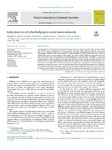Mostrar o rexistro simple do ítem
Early Detection of Cyberbullying on Social Media Networks
| dc.contributor.author | López-Vizcaíno, Manuel F. | |
| dc.contributor.author | Nóvoa, Francisco | |
| dc.contributor.author | Carneiro, Víctor | |
| dc.contributor.author | Cacheda, Fidel | |
| dc.date.accessioned | 2021-03-08T17:11:25Z | |
| dc.date.available | 2021-03-08T17:11:25Z | |
| dc.date.issued | 2021-05 | |
| dc.identifier.citation | Manuel F. López-Vizcaíno, Francisco J. Nóvoa, Victor Carneiro, Fidel Cacheda, Early detection of cyberbullying on social media networks, Future Generation Computer Systems, Volume 118, 2021, Pages 219-229, ISSN 0167-739X, https://doi.org/10.1016/j.future.2021.01.006. | es_ES |
| dc.identifier.issn | 1872-7115 | |
| dc.identifier.uri | http://hdl.handle.net/2183/27438 | |
| dc.description.abstract | [Abstract] Cyberbullying is an important issue for our society and has a major negative effect on the victims, that can be highly damaging due to the frequency and high propagation provided by Information Technologies. Therefore, the early detection of cyberbullying in social networks becomes crucial to mitigate the impact on the victims. In this article, we aim to explore different approaches that take into account the time in the detection of cyberbullying in social networks. We follow a supervised learning method with two different specific early detection models, named threshold and dual. The former follows a more simple approach, while the latter requires two machine learning models. To the best of our knowledge, this is the first attempt to investigate the early detection of cyberbullying. We propose two groups of features and two early detection methods, specifically designed for this problem. We conduct an extensive evaluation using a real world dataset, following a time-aware evaluation that penalizes late detections. Our results show how we can improve baseline detection models up to 42%. | es_ES |
| dc.description.sponsorship | This research was supported by the Ministry of Economy and Competitiveness of Spain and FEDER funds of the European Union (Project PID2019-111388GB-I00) and by the Centro de Investigación de Galicia “CITIC”, funded by Xunta de Galicia (Galicia, Spain) and the European Union (European Regional Development Fund — Galicia 2014–2020 Program) , by grant ED431G 2019/01 | es_ES |
| dc.description.sponsorship | Xunta de Galicia; ED431G 2019/01 | es_ES |
| dc.language.iso | eng | es_ES |
| dc.publisher | Elsevier BV | es_ES |
| dc.relation | info:eu-repo/grantAgreement/AEI/Plan Estatal de Investigación Científica y Técnica y de Innovación 2017-2020/PID2019-111388GB-I00/ES/DETECCION TEMPRANA DE INTRUSIONES Y ANOMALIAS EN REDES DEFINIDAS POR SOFTWARE | |
| dc.relation | info:eu-repo/grantAgreement/AEI/Plan Estatal de Investigación Científica y Técnica y de Innovación 2017-2020/PID2019-111388GB-I00/ES/DETECCION TEMPRANA DE INTRUSIONES Y ANOMALIAS EN REDES DEFINIDAS POR SOFTWARE | |
| dc.relation.uri | https://doi.org/10.1016/j.future.2021.01.006 | es_ES |
| dc.rights | Atribución-NoComercial-SinDerivadas 4.0 Internacional | es_ES |
| dc.rights.uri | http://creativecommons.org/licenses/by-nc-nd/4.0/ | * |
| dc.subject | Cyberbullying | es_ES |
| dc.subject | Social networks | es_ES |
| dc.subject | Early detection | es_ES |
| dc.subject | Machine learning | es_ES |
| dc.title | Early Detection of Cyberbullying on Social Media Networks | es_ES |
| dc.type | info:eu-repo/semantics/article | es_ES |
| dc.rights.access | info:eu-repo/semantics/openAccess | es_ES |
| UDC.journalTitle | Future Generation Computer Systems | es_ES |
| UDC.volume | 118 | es_ES |
| UDC.startPage | 219 | es_ES |
| UDC.endPage | 229 | es_ES |
| dc.identifier.doi | 10.1016/j.future.2021.01.006 |






